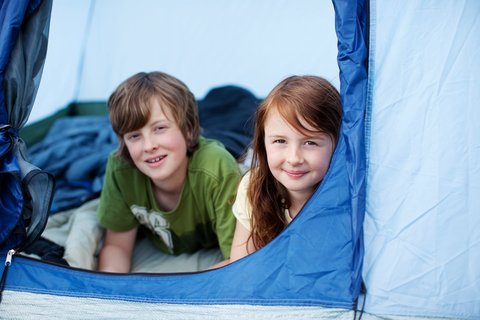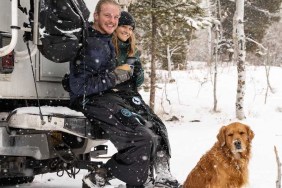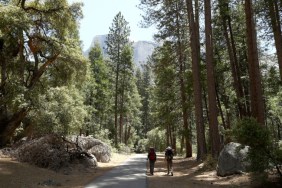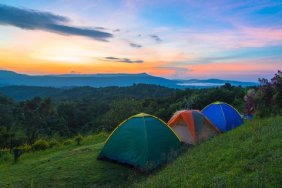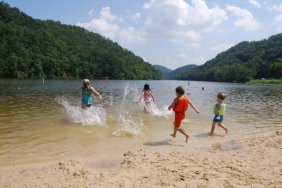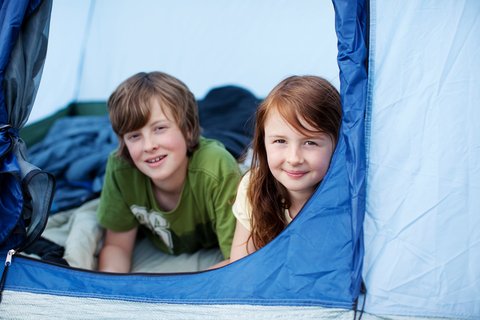
Families who want to unplug and spend time outdoors are introducing their children at a young age to the beauty and simplicity of nature by taking them camping. And while there are certainly challenges to camping with kids, the rewards often come from watching them have amazing first-time experiences and setting them on the road toward a lifetime of outdoor adventures. ()
Some careful planning and a few helpful tips make for a memorable and successful camping experience!
1. Start Small
Your child’s first camping experience doesn’t have to take place a great distance from your home! Start with a trial run in the backyard to give them an idea of what camping will be like. Major outdoor stores will teach you some of the basics if you’re a novice yourself: how to pitch the tent and mastering building a fire, and they often rent equipment if you’re not ready to commit to purchasing expensive gear. Your first real trip should be just one or two nights at a camping area within a short driving distance from home. Do your research to find a location that fits your needs and will capture your children’s interests. Sites with visual beauty near lakes and waterfalls appeal, but there will be water safety issues. Research the trails so you find a system the kids can manage when you hike together.
2. Make a List
Preparation and giving kids a say in the plan builds their excitement. While you supply the essentials like the tent, sleeping bags, maps, first aid items, extra clothing and food, let the little ones pick out something fun to bring along…a Frisbee or football, a special blanket or stuffed toy that makes them feel secure. Every child should have his or her own flashlight. Kids like having their own light source and it can be fun playing flashlight tag on the roof of the tent, and comforting for them to have when sitting around the campfire as night descends. Make your list and include snacks, games, and hygiene items so you can check off as packing takes place.
3. Share Favorite Experiences
Even little activities like roasting marshmallows on the campfire are more fun when shared with your kids. Go off path and let children discover nature: unusual plants and bugs, special rocks, pinecones and nuts, a variety of leaves. It’s your opportunity to teach them about new things, and to show them what to avoid – like poison ivy and the small animals you might spot who don’t want to be fed or petted. Show them how to skip stones in a creek or lake, and listen to the sounds made by birds.
4. Remember Safety
Pack along plenty of water to avoid dehydration from heat and activity level. Make sure that everyone wears sunscreen since they’ll be outside for long periods of time, and reapply it frequently. Avoid bug bites with a time-release insect repellent, and have rain gear to keep everyone warm and dry in case of showers. Seek shelter in bad weather, especially using caution when lightening is in the area. Stay with your children so they don’t wander off and risk getting hurt or lost. A lanyard with a whistle for each child to wear is a good extra precaution. Teach your children a signal – three short whistle blasts – to use in an emergency.
5. Dirt Won’t Hurt
A little dirt won’t hurt, and it’s part of any normal camping experience. Everyone can wash away some of the day’s dust in a creek, or use a container of water warmed on the campfire to sponge off at night. A change of clothing makes everyone feel fresher, but it’s silly to stress about the nightly tub ritual for camping kids. Chances are they’ll think that missing a bath or two is a highlight of this adventure!
6. Prep/Pack Meals Ahead of Time
Prep and pack meals that can be prepared quickly and easily, and bring lots of snacks like dried or fresh fruit. Frozen sausage links make a hearty outdoor breakfast, stews and soups can be frozen and kept cold in a cooler before being heated up in a JetBoil, and hot dogs and s’mores are popular, roasted on sticks over an open flame. Kids (adults, too) will work up bigger appetites with extra outdoor activities, so pack plenty: crackers, protein bars, and other grab-and-go items for the trail. Store your food safely and responsibly to avoid attracting wildlife.
7. Appreciate Simple Pleasures
Counting stars in the night sky while listening to night sounds, spending a first night in a sleeping bag, and even doing easy chores – gathering firewood, filling water containers, hammering in tent stakes – can all be fun experiences for kids new to camping. Use this outdoor time together to teach your children basic outdoor skills, safety rules, and how to both respect and enjoy nature. As they become familiar with a camping lifestyle any fears will be eliminated and they’ll gain an appreciation for thing that often go unnoticed in the bustle of everyday routine. The life of a child is a journey of new experiences, and camping can be the gateway to their discovery of the wonders of nature as they begin learning to appreciate the outdoors and build memories that can last a lifetime.
